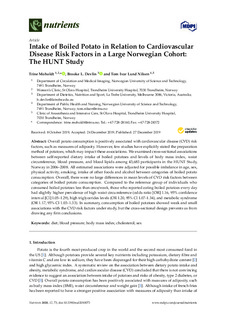Intake of Boiled Potato in Relation to Cardiovascular Disease Risk Factors in a Large Norwegian Cohort: The HUNT Study.
Journal article, Peer reviewed
Published version

Åpne
Permanent lenke
http://hdl.handle.net/11250/2634676Utgivelsesdato
2019Metadata
Vis full innførselSamlinger
Sammendrag
Overall potato consumption is positively associated with cardiovascular disease (CVD) risk factors, such as measures of adiposity. However, few studies have explicitly stated the preparation method of potatoes, which may impact these associations. We examined cross-sectional associations between self-reported dietary intake of boiled potatoes and levels of body mass index, waist circumference, blood pressure, and blood lipids among 43,683 participants in the HUNT Study, Norway in 2006–2008. All estimated associations were adjusted for possible imbalance in age, sex, physical activity, smoking, intake of other foods and alcohol between categories of boiled potato consumption. Overall, there were no large differences in mean levels of CVD risk factors between categories of boiled potato consumption. Compared to the reference group of individuals who consumed boiled potatoes less than once/week, those who reported eating boiled potatoes every day had slightly higher prevalence of high waist circumference (odds ratio [OR] 1.16, 95% confidence interval [CI] 1.05–1.29), high triglycerides levels (OR 1.20, 95% CI 1.07–1.34), and metabolic syndrome (OR 1.17, 95% CI 1.03–1.33). In summary, consumption of boiled potatoes showed weak and small associations with the CVD risk factors under study, but the cross-sectional design prevents us from drawing any firm conclusions.
